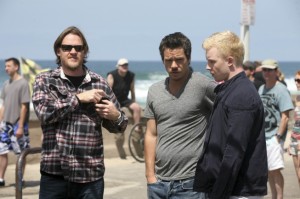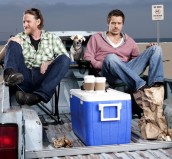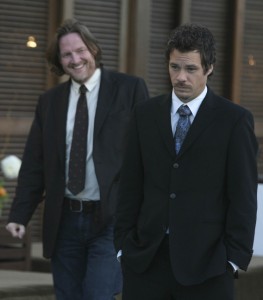TERRIERS was a series that concluded its thirteen-episode run a few weeks ago on FX. The series chronicled the adventures of unorthodox private eyes Hank Dolworth, played by Donal Logue, and Britt Pollack, played by Michael Raymond-James, who stumble upon a clandestine land deal that will be bad for their beloved San Diego.
Like a lot of shows that have low ratings, TERRIERS did not survive to its second season.
Unlike practically any other canceled show in memory, TERRIERS had the network president, John Landgraf, explain to both the press and the series creative team exactly what went into the thinking behind the cancellation.
Tim Minear, one of TERRIERS’ executive producers with Shawn Ryan and series creator Ted Griffin, is no stranger to short-lived television series after working in a show-runner capacity on WONDERFALLS and the legendary FIREFLY and creating DRIVE (which lasted two weeks). Heck, even his Twitter handle is actually CancelledAgain.
He’s also worked on a few other shows that lasted longer, albeit still had somewhat abrupt exits, including THE ADVENTURES OF LOIS AND CLARK and, with Joss Whedon, ANGEL and DOLLHOUSE. However, Minear agrees that the TERRIERS experience is unlike any he has had before.

Donal Logue, Michael Raymond-James and Noel Fisher in TERRIERS - Season 1 -"Missing Persons" | ©2010 FX/Patrick McElhenney
In Part 1 of our exclusive interview, he talks frankly about his TERRIERS experience and what the future holds for him and Shawn Ryan.
ASSIGNMENT X: You’ve been through a few cancellations, but just from what FX president John Landgraf did in terms of speaking with the press about it, I gather TERRIERS is somewhat unique.
TIM MINEAR: I would say that’s true.
AX: In that press session, John Landgraf said that he had brought you and fellow TERRIERS executive producers/show runners Shawn Ryan and creator Ted Griffin in for a meeting to discuss the cancellation with you. Did you actually learn anything new about the cancellation process or was that just new in terms of the level of respect shown to you and the canceled series by the network?
MINEAR: It was both. We’d wanted to come in and try to convince him to pick it up. That’s what that was about, but he had done all this market research to really probe why the show hadn’t launched [to bigger ratings]. And there was a conventional wisdom that he had been forming, that it had been the combination of the promotions and the poster and the title. All those things probably to one degree or another, affected that. What he sat us down to show us was that he really explored those things, and the conventional wisdom didn’t really hold with the numbers in some ways.
Sometimes it’s just a mystery of timing, of alchemy, of whatever, the mood that the country’s in at the time and the mood that the audience is in at the time, how something launches. So I think we did learn something, a little bit. And certainly it was the first time – and I told him this in the room – that the president of the network had brought me in, or brought me and my partners in, to really explain why he was about to do this thing he kind of had to do. And so we ended up feeling pretty good, in a strange way.
AX: John Landgraf said that he felt the problem might be that one of the best things about TERRIERS was its subtlety and unfortunately, the American public right now doesn’t seem to want subtlety. First of all, do you agree with that assessment, that what was good about TERRIERS versus the lack of public appetite for subtlety might have been one of the problems?
MINEAR: Boy, if I knew those things, I probably wouldn’t be making just thirteen episodes [laughs]. Do I think the show was too subtle? I don’t know. In the third episode, the guys jump out of a window after Hank says, “Smell my finger.” I’m not sure how subtle that is [laughs]. [The abundance of subtlety] may have applied more to the pilot and the first episode than the rest of it, because the truth is, you always try to find that “Holy sh*t!” moment. You really want to have the audience have that thrill of, “I can’t believe that just happened, and yet I totally buy into it, it was completely earned and I totally understand why that character would do that morally questionable thing, or make that bad choice, even though they knew they were making a bad choice.” That’s the best kind of television, as far as I’m concerned.
AX: At least TERRIERS did get to the end of its planned run, instead of being canceled with a bunch of episodes left unaired.
MINEAR: Yeah. It’s so funny, because after my experience on network TV, I have been whining about wanting to do a cable show for perhaps five years. The first thing I did was LOIS AND CLARK, which was obviously ABC, so, network. When I went to ANGEL, it really was kind of the forerunner of the cable world, because the WB was a netlet. It wasn’t one of these big networks. The numbers that we needed to sustain in order to keep the show on the air were a fraction of what you would need on a major network. In fact, even on FIREFLY, which was a resounding failure on a network, the lowest numbers we ever got were more than the biggest numbers BUFFY ever got on the WB or on UPN. So it goes to show you that something can be considered a success just depending on the venue in which it lives.
So I’d always wanted to go to cable, because I thought, “Well, maybe my sensibilities are more suited to that, and plus, I don’t have to worry about being canceled” [laughs]. It’s almost as though the exact same thing happened to me on cable, just in a smaller and, in a way, bigger fashion, because the numbers were so miniscule. I will say this – the thing that really surprised me was, with the very low ratings that we were getting, that John Landgraf not only kept the show on the air through the end of its first thirteen episodes, but he didn’t change the night it was on. And I know he was getting pressure from number crunchers to move it out of that valuable primetime real estate and to just burn it off at some other time and to not air the repeats, or whatever. He didn’t do that. So that to me is really what makes me respect everything he has to say after the fact, because he took a hit to do that, and that was a creative decision and a decision based on respect for the work that we had been doing all summer making the show, before it aired.
So that was a big thing. And of course, again, after my experience, my philosophy is always to try to make the first thirteen its own unit of drama, so if that’s what you end up with, just thirteen, now that things live on on DVD, that it would be its own somewhat satisfying experience, even if you never get to do an episode after that. I think we accomplished that.
AX: Can you talk about what Season Two would have been?
MINEAR: I don’t think [the main characters Hank and Brit] went to Mexico. I think for sure Brit would have gone to jail and served his time and we probably would have come back after a period of six months or whatever and played the first couple of episodes with Brit still in prison and Hank doing whatever he would be doing and we’d find a story inside that prison that we could bring outside into the world. That would be one possibility of where we’d be going. The truth of the matter is, as is often the case in episodic television, you’re so trying to keep in front of the giant rolling ball, like in RAIDERS OF THE LOST ARK and not get flattened by production and keep the schedule going and have the scripts ready in time to shoot that we were behind almost from Day One. We didn’t really get all that far into plotting out what the second season would be, because we were so under the gun just trying to get the first season up on its feet. But the idea of starting with Brit in prison and not picking up exactly where we left off, but after some period of things having been shaken up a little bit is probably where we would have come in.
AX: Do you think there’s any other form of life for TERRIERS, like novels or comic books?
MINEAR: I think probably not, but I think I’ve learned after my experience on ANGEL and FIREFLY not to count things out, because things often have an afterlife that you weren’t expecting. BUFFY and ANGEL and FIREFLY comics are still happening, the graphic novels are still happening, obviously there was a feature film [SERENITY] after FIREFLY went down, we had talked about permutations of two-hour BUFFY-verse movies a few years ago. Who knows what life it might have left? And the truth is, I think for sure that if there’s not further ancillary life for TERRIERS, there’s definitely further ancillary life for the combination of Griffin and Minear and Ryan.
AX: In fact, you and Shawn Ryan have a new show for Fox premiering in February.
MINEAR: It’s called THE CHICAGO CODE. It’s more than just a cop show, because it’s really about Chicago. Chicago is absolutely a character in the story. It’s about municipal corruption, it’s about the specific character of that city and how things get done there, it’s about the first female police superintendent of the city and about her old partner, who is still a detective on the street and they team up and as this team, track down this sort of larger corruption in the system. So it’s definitely more than just, here’s a dead body, here’s a case.
AX: Is that shooting in Chicago?
MINEAR: Yes. It sure is.
AX: Is it hard doing a show when the writers/producers are in L.A. and production is somewhere else?
MINEAR: It really is. I’ve done it before. We shot WONDERFALLS in Toronto and the writers were in L.A. When I was on THE X-FILES, [production was] in Vancouver and the writers were also here in L.A., so it’s not an unusual situation. It does make it more difficult. As a matter of fact, we shot TERRIERS in San Diego, which is at least in the same state. It really is almost as remote as shooting in Chicago. You can’t just walk down to the set and there’s just no question about it – it always leaves the cast and the crew who are there to protect the franchise a little bit adrift, because the creators and the writers aren’t right there. So what we always try to do, and what Shawn always does is, for whichever episode is shooting, the writer of that episode goes out to wherever we’re shooting and is there for prep and is there for the shoot with the director, every step of the way. It’s still not the same as being able to walk out of the writing offices at Stewart Street onto the set of BUFFY or being at Fox and walking onto the spaceship for FIREFLY, it still doesn’t substitute for that kind of intimacy, but we do what we can to try to keep things as close to home as we can.
AX: Do you feel like you learned anything from the TERRIERS experience that will be helpful going forward into CHICAGO CODE?
MINEAR: Well, you always learn something. I mean, Shawn did change the title of CHICAGO CODE from RIDEALONG. RIDEALONG is a great title, but it doesn’t maybe have the specificity of THE CHICAGO CODE. THE CHICAGO CODE may not be as poetic as RIDEALONG, it may be a little more unsubtle and on the nose, but I think that what we did learn – and of course, I learned this before – is that your title needs to be part of your marketing. It needs to say something to the audience to break through the noise of everything else that’s out there. If you have something like HEROES, that’s a great title. And you can see that title, even in print, with those characters standing in front, with the sun behind the Earth, and you know what that show is promising to be, and then you tune into the pilot and it delivers on that promise. Well, I knew this going back to – pretty much every show that I’ve worked on has had a terrible title. WONDERFALLS doesn’t tell you anything, THE INSIDE doesn’t tell you anything, FIREFLY doesn’t tell you anything – none of these titles tell you anything. [TERRIERS sounds like it will be] a reality show about dog grooming. On the other hand, I will say this, when I imagined DRIVE, I thought, “Well, DRIVE – that is an active title. It’s one word, it tells you everything you need to know about this underground cross-country road race” – and nobody watched that either. So I have no answers [laughs].
CLICK HERE for more TERRIERS interviews
CLICK HERE to read PART 2 of ASSIGNMENT X’s three-part exclusive Tim Minear interview where he discusses his tenure on DOLLHOUSE and what Season Three would have been
Related Posts:












